By Olatunde Dodondawa
It is unfortunate that Nigeria, the giant of Africa that ended the civil war in and brought peace to Liberia, is fighting insurgency for a decade without any sign of victory in sight. The insurgency that started in 1999 was alleged to have been supported by the former Governor of Borno State, Ali Modu Sheriff, a claim he has denied several times.
In December 2015 when President Muhammadu Buhari announced to the world that Book Haram has been technically defeated, many Nigerians believed him because he is a retired General in the Nigerian Army who should understand how best to fight these terrorists as compared to the former President Goodluck Jonathan who had no military experience.
However, sources within the Presidency confirmed to The Dodondawa Post that Boko Haram was holding no land territory within Nigeria as at late 2015 and most part of 2016; but now, they are back and better than the Nigerian military.
According to a source in the Presidency, who pleaded anonymity because he wasn’t authorized to speak, “the budget to fight insurgency is about $320million annually and this is the reason some politicians and military commanders are feeding fat while the insurgency lasts. If you really want to uncover the truth, investigate how they came about the North East Development Commission (NEDC). Like its counterpart in the Niger Delta (Niger Delta Development Commission), this agency will serve as a conduit to siphon monies for the politicians, money laundering and to sponsor (finance) elections. Now, they have created another unrest through banditry and kidnapping in the north west. Soon, they will establish North West Development Commission for same purpose.
“The soldiers are demoralized today because they are facing many ‘artificial’ war fronts within Nigeria, they are ill-equipped for these tasks, their welfare is very poor and there has been lack of support from the military headquarters. The Army Chief (General Buratai) is the longest serving Chief of Army Staff. Though, it seems he lacks new ideas to end the insurgency, but because he belongs to the ruling circus (cabal), he continues to hold sway while the soldiers are dying and being secretly buried every day. While I can’t confirm those behind the ISWAP (a splinter group from Book Haram), but I can confirm to you that their style of attacking only military formations is to expand their territory within Nigeria. And they are expanding just like their parent body, ISIS, whom they pledged allegiance was doing in Syria and Iraq.”
ISWAP controls four of the 10 zones in Borno State, near Lake Chad, according to security analysts and a federal official. The militants are pulling off almost daily attacks including opening fire recently on the convoy of the governor of Borno State.
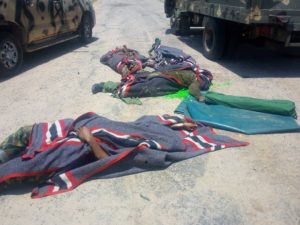
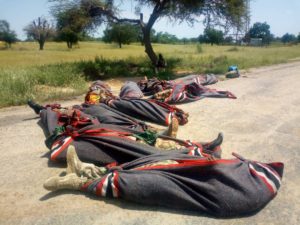
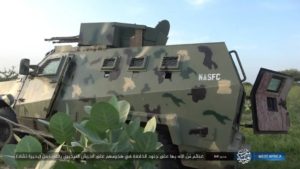
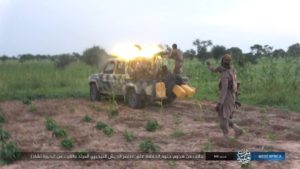

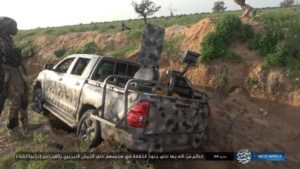
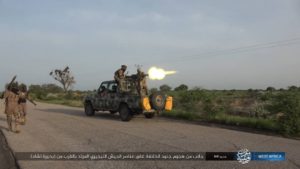

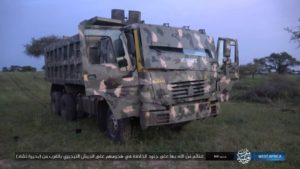
Besides, according to New York Times, Book Haram now operates with sophisticated drones. In its publication titled: “Boko Haram Is Back. With Better Drones” the reputable newspaper revealed.
The military announced in August that it is pulling back its troops from far-flung outposts in the countryside and gathering them into fortified settlements it calls “super camps.” Military commanders, faced with complaints that their strategy is old and ineffectual, say that the super camps are a new, more effective way of dealing with an insurgency that is now able to pull off more complicated attacks against the military.
But some officials call the super camps an outright retreat. One federal official, who asked not to be identified out of fear that criticizing the military would jeopardize his safety, said that soldiers were merely barricading themselves inside super camps. The official said that Boko Haram fighters are raiding the gear the soldiers are leaving behind as they abandon their posts for the super camps.
Military commanders, faced with complaints that their strategy is old and ineffectual, say that the super camps are a new, more effective way of dealing with an insurgency that is now able to pull off more complicated attacks against the military.
Corruption may also be prolonging the war, according to some government officials, security analysts and aid workers. In northeast Nigeria, Boko Haram has long been accused of profiting from illegal fishing along Lake Chad, where all fishing is outlawed, and from taxing passing vehicles. Now, the military is being accused of doing the same.
The government allocates the equivalent of nearly $80 million dollars each quarter to the war effort, and yet Nigerian soldiers lack ample ammunition and medical care, leaving many residents to ask where all the money is going. Earlier this year in Rann, where there is no lighting after sundown, disgruntled soldiers without night vision gear abandoned their posts, according to several aid workers. Some soldiers have fled in the face of attacks rather than staying to fight, according to accounts from residents.
It is that bad.




